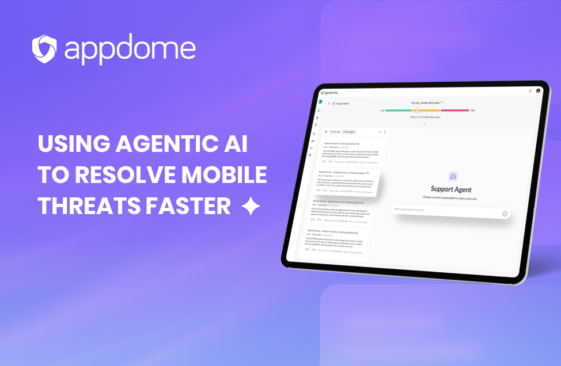In 2023, the global video streaming market was valued at $554B and the global music streaming market at $41B. When looking at the streaming market on mobile apps; mobile apps represent 45% of video streaming and an astonishing 97% of music streaming was done on mobile apps. That means that close to $290B in mobile streaming revenue is coming from mobile apps. However, this rapid growth has also attracted cyber criminals targeting mobile streaming apps and their users. In this blog, we will explore the top 5 cyber threats and provide the top 5 practical ways app makers can easily secure mobile streaming apps.
The top 10 mobile video streaming providers globally are:
- Netflix
- YouTube
- Amazon Prime Video
- Disney+
- Hulu
- HBO Max
- Apple TV+
- ESPN+
- Twitch
- Spotify
The top 5 mobile music streaming providers globally are:
- Spotify
- Apple Music
- Amazon Music
- Tencent Music
- YouTube Music
Top 5 Cyber Threats on Mobile Streaming Apps
While there are many threats and attacks on mobile streaming apps, here are the top 5 cyber threats on mobile streaming apps.
Malware and Spyware:
This poses the biggest risk to consumers. Hackers and fraudsters can create clones and mods and inject malware into these malicious apps and disguise them as legitimate versions of streaming apps and distribute them via unofficial app stores. A popular way to get consumers to download these trojan apps is to advertise them to get access to premium services without having to pay for the subscription or via Social Engineering attacks.
This malware and spyware can compromise user privacy, steal sensitive information such as login credentials or payment details. But they can also be used as trojan apps to launch malware attacks on other apps such as banking apps installed on the consumer’s device.
Consequences: Users may suffer monetary loss through fraudulent transactions, identity theft, or unauthorized access to personal data. Malware and spyware can also degrade device performance, compromise user safety, and damage the reputation of the streaming app.
Account Takeover (ATO):
This is a common attack you hear from a lot. “I’ve been locked out of my account” or “Somebody took over my account” and it is very personal to consumers. Not only can hackers start using the consumer’s account and access premium content, but the consumer will also have lost all their history, curated playlists, and the associated recommendations. To successfully complete an Account Takeover, attackers employ various techniques like phishing, credential stuffing, Man-in-the-Middle attacks, or brute force attacks to gain unauthorized access to user accounts.
Consequences: ATO can lead to monetary loss, privacy violations, and reputational damage for both users and the streaming app provider. It can also result in service disruptions, loss of trust among users, and legal consequences due to regulatory non-compliance.
Geo-Location Based Restrictions Evasion:
This is the biggest risk to mobile streaming apps. A lot of streaming content may be geo-blocked, subject to regional restrictions or restricted under digital rights management (DRM). But users (both malicious and non-malicious) may use VPNs or other techniques to bypass these restrictions, potentially violating content licensing agreements and intellectual property rights.
Consequences: Evasion of location-based restrictions undermines content licensing agreements, violates intellectual property rights, and diminishes the revenue potential of legitimate content distribution channels. It may lead to legal action, financial penalties, and reputational damage for the streaming app provider.
Unauthorized Content Access:
Paired with geo-location restricting, preventing unauthorized content access is the biggest revenue and legal threat to mobile streaming apps. Fake apps, mods, and clones as well as stolen credentials are the most common attempts to circumvent payment mechanisms or digital rights management (DRM) protections to access premium content without proper authorization. This includes illegally distributing copyrighted material or sharing login credentials.
Consequences: Unauthorized content access undermines the revenue model of streaming platforms, violates intellectual property rights, and diminishes the value of legitimate content distribution channels. It can also lead to legal action, financial penalties, and reputational damage for the streaming app provider.
Weaponizing the Mobile Streaming Apps for Denial of Service (DoS) Attacks:
And finally, if a malicious entity were to try to disrupt a streaming service, they can weaponize the mobile app, run it in many different virtual environments and server farms to launch bot attacks and try to flood the service with a high volume of traffic, causing slowdowns or service outages. This impacts user experience, undermines trust in the platform, and may lead to financial losses.
Consequences: DoS attacks disrupt service availability, leading to user frustration, loss of revenue, and damage to the reputation of the streaming app provider. It may also result in legal liabilities for failing to maintain adequate infrastructure and security measures.
Top 5 Ways to Secure Mobile Streaming Apps
Here are the 5 easy ways to secure mobile streaming apps and protect the consumer experience.
1. Prevent Fake, Mods and Clones and Enforce App Store Signature Validation
Protect your Android and iOS app from being altered, counterfeited, or infected with harmful code, which can deceive users and potentially turn your app into a tool for attacking other apps on users’ devices. Appdome offers safeguards like Google Play and Apple App Store Signature Validation, Runtime Bundle Validation, and Runtime Application Self-Protection (RASP) to stop unauthorized debugging and tampering. By utilizing these protections, mobile streaming services can prevent the creation of fake, modified, or cloned apps. This ensures that users can only access the genuine app from official app stores, shielding them from malware hidden within fraudulent versions of the app, also known as trojans.
2. Block Malware and Social Engineering Attacks
Appdome’s anti-malware features safeguard Android and iOS apps from malware threats. In the Android realm, there is a bustling underworld of malware with its frameworks, tools, and tricks. Meanwhile, the iOS scene is evolving, with the emergence of alternative app stores, allowing users to download apps directly from websites. Appdome ensures that mobile streaming services can protect their apps, users, and data from on-device malware on both Android and iOS platforms, which can be used to target apps and users. Furthermore, Appdome offers protection against voice phishing (Vishing) and telephone-oriented attack delivery (T.O.A.D), wherein criminals use phone calls to deceive individuals into divulging sensitive information or carrying out harmful actions, potentially leading to account breaches.
3. Block Identity Theft, Prevent Account Takeovers
Identity theft and account takeovers can be deeply distressing experiences. Not only do users lose access to their subscription services, but they also risk losing their entire streaming history, playlists, and recommendations. It is no wonder that in Appdome’s yearly survey on Consumer Expectations on Mobile App Security, 55.1% of global consumers identified “synthetic fraud,” which includes identity theft, account takeovers (ATOs), fake apps/transactions, and similar attacks, as their top concern when using mobile applications.
With Appdome, brands can fortify their mobile streaming apps against credential theft. This is done by encrypting the data where usernames and passwords are stored. Additionally, the apps are safeguarded against credential stuffing attacks and other brute force attempts, which could lead to account takeovers.
4. Ensure Geo-Compliance While Maintaining a Good User Experience
Many geo-compliance solutions today rely on software development kits (SDKs) which do not blend smoothly with other mobile app security tools. This poses a challenge for makers of mobile streaming apps who want to ensure geo-compliance and safeguard their apps from cyber threats. Appdome offers a solution by providing a unified platform where content streaming providers can easily incorporate over 300 mobile app defense features, including geo compliance, into their Android & iOS apps directly within the DevOps CI/CD pipeline. This ensures that mobile devices accurately identify their location, complying with know-your-customer (KYC) policies, regulatory restrictions, and authentication workflows.
Appdome enables mobile streaming apps to detect spoofed locations, fake GPS apps, VPNs, and other methods used to bypass geolocation controls, enhancing security. Instead of denying access to users outside the designated geo-location, brands can leverage Appdome’s Threat-Events service to enhance user experiences by offering special premium subscriptions for legally restricted content like sports broadcasts (Superbowl, FIFA world cup, Olympic Games), and certain movies.
5. Prevent Mobile Bot Attacks
One of the biggest nightmares for any mobile brand is having their mobile apps turned into weapons that harm their business, disrupt user experience, and tarnish the brand’s reputation. Hackers can exploit vulnerable apps, replicate them in massive numbers on virtual servers, and unleash bot attacks to disrupt streaming services. With Appdome’s MOBILEBot™ Defense solution, streaming brands can safeguard their apps by marking them as legitimate, preventing clones, and effectively stopping mobile bot attacks, credential stuffing, DDoS attacks, and other threats.
Get Started Today to Build Secure Mobile Streaming Apps
Protecting your mobile streaming apps with Appdome is simple. It is your one-stop shop for mobile app defense, and it is quick and easy. No need for coding or dealing with limited SDKs. Request a demo to discover how you can secure your mobile streaming apps effortlessly today!







